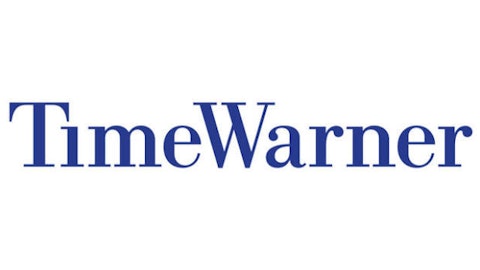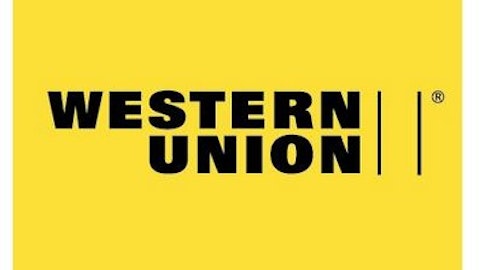When money-transfer giant The Western Union Company (NYSE:WU) reported its second-quarter earnings on Tuesday, the stock soared by as much as 9.5% as the results came in far better than analysts expected. The company cut prices on many of its services to better compete with rival Moneygram International Inc (NYSE:MGI) and upstart Xoom Corp (NASDAQ:XOOM), and while a decline in profits was expected, increased volume caused that decline to be smaller than anticipated.
Total revenue declined 3% while net income fell 27% year-over-year, with EPS falling only 18% due to share buybacks over the past year. The diluted share count has been reduced by 9% since the end of Q2 2012, and the quarterly dividend has been increased by 25% during that time.
The long-term picture

Even as growth in most parts of its business is slow or non-existent, there is one segment which is booming — electronic channels. Electronic revenue grew 26% as westernunion.com saw transfer transactions rise 68%. The company expects this channel to grow rapidly in the coming years and eventually make up a significant portion of total revenue.
One thing to note here is that recent IPO Xoom is currently valued at about $1.1 billion with only $87 million in TTM revenue and no profits to speak of. With The Western Union Company (NYSE:WU)’s electronic business roughly twice the size in terms of revenue, it would be valued by the market at a few billion dollars, a significant fraction of Western Union’s $10 billion market capitalization.
Western Union, then, has a growth stock lodged inside of a value stock, and once the online business grows bigger, the company should resume revenue growth. This is likely a few years away, but Western Union is planting the seeds for this future growth today.
Dividends and buybacks
Even if profits were to remain constant, The Western Union Company (NYSE:WU) offers a compelling opportunity. When I first wrote about Western Union in January, the stock was trading at about $13.50 per share, and since then, it has risen by about 35%. Often, it’s the most boring stocks which can give above-average gains due to a mix of pessimism and shortsightedness by the market. Today, the stock is not nearly as cheap, but long-term, it’s still an excellent choice.
The Western Union Company (NYSE:WU) returns much of its profits to shareholders through dividends and share buybacks. So far this year, the company has spent $140 million on dividends and $314 million on share buybacks, and the company expects to return a total of $700 million to shareholders in 2013.
Let’s imagine that The Western Union Company (NYSE:WU) generates $900 million in free cash flow every year for the next ten years. The dividend, which is currently $0.50 per share each year, rises by 10% per year, and the remaining free cash flow is used to buy back shares. I’ll assume that the average repurchase price rises by 10% per year as well, as using the current share price would be unrealistic.
In this scenario the dividend would grow to $1.30 per year at the end of ten years, and during that time, you would collect $8.77 in dividends per share. That’s a 48% return from dividends alone. The payout ratio would only be about 50% due to the buybacks. The share count would decline by 34%, meaning that each share would now represent a significantly larger portion of the company. If the P/E ratio remains constant, then your total return over ten years would be 82%, or about 6.2% annualized.
Now, this may not seem great, but remember that this return is solely due to dividends and buybacks and assumes no growth whatsoever and no change in the P/E ratio. The fact that, under this scenario, the dividend more than doubles would likely lead to the stock appreciating significantly more than the 34% due to the buybacks. Right now, the payout ratio is below 30%, and combined with the effect of the buybacks, the dividend can grow by double-digit percentages for years to come without eating up too much of the cash flow. For this reason Western Union is part of The Ultimate Dividend Growth Portfolio.
The dominating company
Being the largest in the industry gives Western Union a distinct advantage. Moneygram International Inc (NYSE:MGI), which holds the number two spot, has nowhere near the margins enjoyed by Western Union. The company posted a loss in 2012 with an operating margin of just 3.9% compared to 23.5% for Western Union. Western Union’s margins have declined a bit due to the lower pricing, but there is still an enormous gap between these two companies. Recently, MoneyGram has been exploring a sale, looking to possibly take the company private.
Xoom Corp (NASDAQ:XOOM), which IPO’d recently, nearly matches the market capitalization of Moneygram International Inc (NYSE:MGI), even though the company is tiny in comparison. While MoneyGram recorded $1.34 billion in revenue in 2012 and is valued at $1.3 billion, Xoom recorded just $80 million in revenue and is valued at $1.1 billion. Xoom shares have nearly doubled since hitting a low earlier this year, but it seems that optimism is the only thing supporting the stock. With Western Union in a dominant position and Moneygram International Inc (NYSE:MGI) unable to be consistently profitable, there is less reason to believe that Xoom has any chance at changing the status quo. Western Union’s online business is growing quickly, and there is nothing that Xoom does that Western Union can’t do.
The bottom line
The Western Union Company (NYSE:WU) is cutting prices in order to stay ahead of the competition, and so far, profits haven’t taken as big a hit as people expected. The company doesn’t expect to cut prices further going forward, so most of the margin contraction should be over. With ample free cash flow and a dedication to returning profits to shareholders, Western Union is a reliable long-term choice. Stocks like Xoom may seem more exciting, but often it’s the boring stocks which give the best returns.
The article An Earnings Beat With Long-Term Potential originally appeared on Fool.com and is written by Timothy Green.
Timothy Green owns shares of Western Union. The Motley Fool recommends Western Union. Timothy is a member of The Motley Fool Blog Network — entries represent the personal opinion of the blogger and are not formally edited.
Copyright © 1995 – 2013 The Motley Fool, LLC. All rights reserved. The Motley Fool has a disclosure policy.


